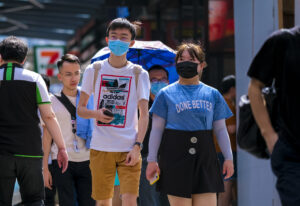
India has reported six novel coronavirus (COVID-19) cases to date, three of which are active. The news comes as the COVID-19 outbreak continues to spark panic worldwide with tens of thousands infected and thousands having lost their lives.
The earliest COVID-19 cases in India were reported in three students who had been returned to Kerala from Wuhan University. The COVID-19 outbreak originated in the city of Wuhan, capital of China’s Hubei province. The three earliest COVID-19 patients have all since recovered. However, in recent days, three fresh cases have been reported on the Indian mainland.
The latest case is of an Italian tourist, who tested positive for the disease in the Rajasthan state capital Jaipur. The other two active cases were reported in the national capital of Delhi and the Telangana state capital of Hyderabad. Both were individuals who had a travel history to countries affected by COVID-19, including Italy and the United Arab Emirates.

At the global level, the COVID-19 outbreak has led to 92,275 infections at the time of writing. The majority of these have been reported from China, where 80,152 confirmed COVID-19 infections have been reported to date. The death toll due to the virus currently stands at 3,130. Of the countries which have reported in excess of 1,000 cases, South Korea has registered 5,186 cases; Iran has reported 2,336 cases; and Italy has recorded 2,036 cases.
Of the 92,275 confirmed COVID-19 infections, 48,450 are of individuals who have recovered. This leaves 40,695 active cases, of which 83 percent (33,597) are of individuals in mild conditions and seventeen percent (7,098) are of individuals who are in serious or critical condition.
The COVID-19 outbreak is understandably generating panic and is prompting action by officials. Following the detection of a case of COVID-19 in Jaipur, the state health department ordered testing of all who had come into contact with the patient. Chief Minister Ashok Gehlot convened an emergency meeting with senior officials of the state health department, including state health minister Raghu Sharma.
The individual who tested positive for COVID-19 in Telangana was a native of the Karnataka state capital of Bengaluru. As such, the Karnataka state government is similarly moving to track those who had been in contact with the individual. In the face of the COVID-19 outbreak, the Telangana health minister has earmarked Rs 100 crore to fight the virus in-state whilst also appealing for calm.
“Today this virus is not…deadlier than swine flu,” Rajendar commented. “The death toll is not more than two to three percent…I urge people to not panic. Any person who is having a fever or cough must consult a doctor.”
An emergency meeting has been held in Delhi, which included Chief Minister Arvind Kejriwal and state health minister Satyender Jain. Kejriwal also met with Prime Minister Narendra Modi to take stock of the situation. Samples of those who came into contact with the individual affected by COVID-19 in Delhi – originally from Agra, Uttar Pradesh – have been sent to the National Institute of Virology in Pune.

In a bid to control the COVID-19 outbreak and prevent its spread, the Union Ministry of Health and Family Welfare has motioned to cancel all visas to Italian, Iranian, Japanese, and South Korean nationals granted on or before March 3rd with immediate effect. This will prevent those nationals from entering India if they have not done so already.
Union Health Minister Dr Harsh Vardhan outlined measures being taken by the Government. “Screening of passengers is being conducted at 21 airports, twelve major seaports, and 65 minor seaports,” he said earlier this week “As many as 557,431 passengers have been screened so far at airports and 12,431 passengers have been screened on minor and major seaports.”
Prime Minister Narendra Modi has spoken out on the COVID-19 outbreak. Taking to Twitter, Modi said that he had “had an extensive review regarding preparedness on the COVID-19 novel coronavirus. Different ministries and states are working together, from screening people arriving in India to providing prompt medical attention.”
Urging calm, the Prime Minister said in a subsequent tweet that “there is no need to panic. We need to work together, take small yet important measures to ensure self-protection.’

